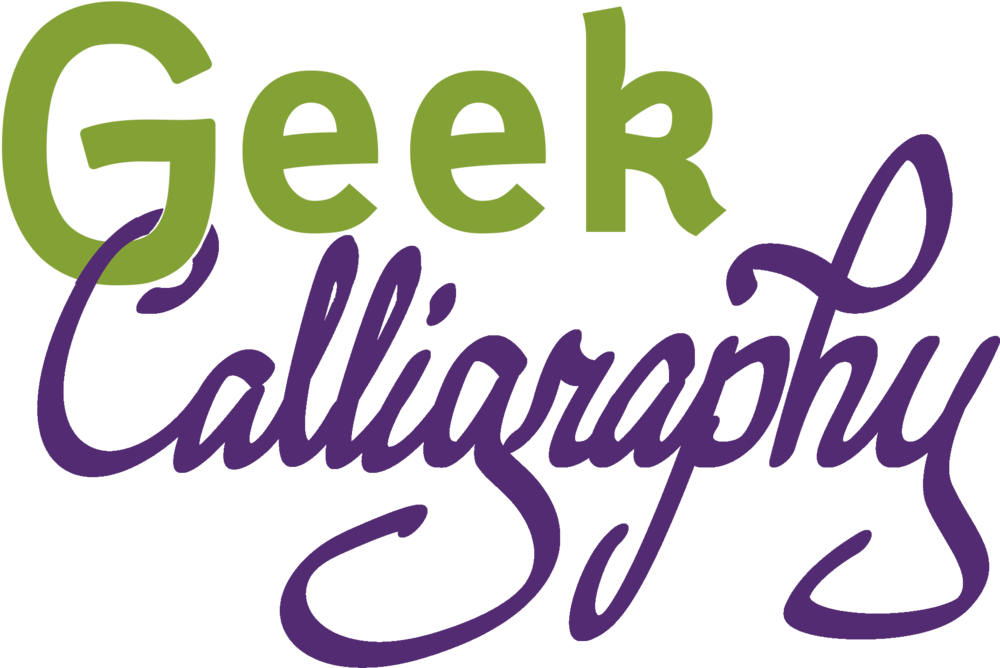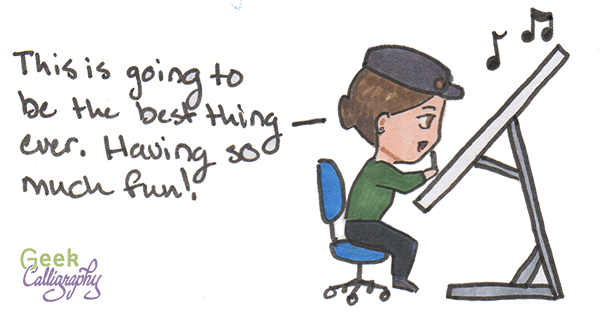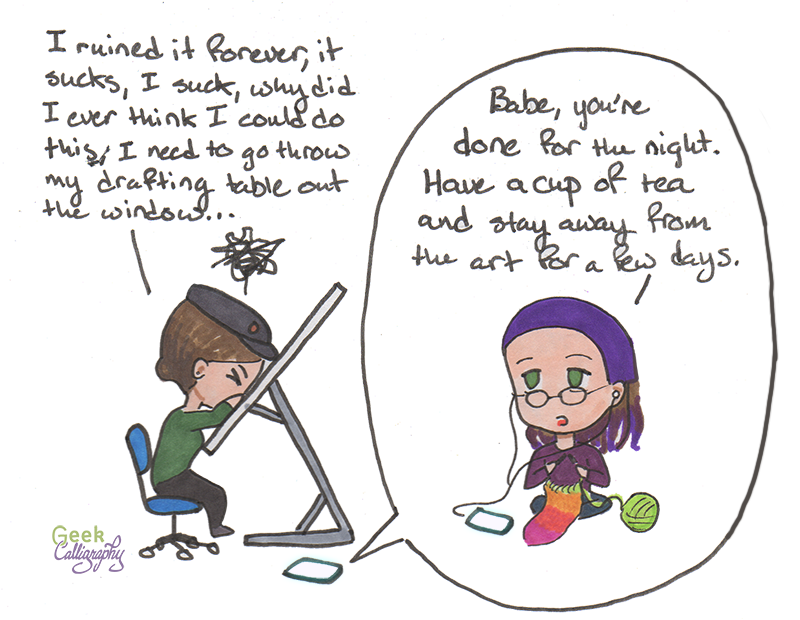by Ariela
It's been a fairly productive year here at Geek Calligraphy. In addition to the launch of our website, we put out 13 new products this year (number 14 to come out in December). We have noticed that our projects all tend to fall into the same pattern. So, we present to you, The Artistic Process of Geek Calligraphy, A Comedy.
Dramatis Personae:
Chibi Ariela - The Artist, identifiable by her black driver's cap with a copper badge.
Chibi Terri - The Manager, identifiable by her purple everything and green eyes.
Stage 1: The Idea
Most of the time, a project starts out like this:
Image shows Ariela and Terri at their respective computers.* Ariela is saying "I have an idea!" and Terri responds "Great, let's put it on the calendar."
*Terri is a Mac user. For her sins, Ariela has a Surface Pro 2 by attrition.
Sometimes, though, Terri is the instigator:
Image shows Terri and Ariela on the phone. Terri says "Have you ever considered doing something with $_idea?" and Ariela responds, "That's really good. I must go do it Right Now!"
Stage 2: The Honeymoon Phase
Most projects start out with starry-eyed idealism, as I am convinced that this project where everything will be perfect.
Image shows Ariela sketching at her drafting table saying to herself "This is going to be the best thing ever. Having so much fun!" Appallingly, she is humming to herself.
Unfortunately, this stage doesn't last.
Stage 3: Reality Intrudes
Image shows Ariela at her drafting table, brow furrowed, saying, "Hmm maybe not quite as easy as I thought."
As with all plans, they don't tend to ever come off exactly as they are on paper. Or, in this case, they don't make it to paper exactly as they were in my mind.
Stage 3 can last a short time or a long time, but it is invariably followed by...
Stage 4: Despair
Image shows Ariela headdesking at the drafting table, eyes squeezed shut, wailing, "I ruined it forever, it sucks, I suck, why did I ever think I could do this, I need to go throw my drafting table out the window..." Terri, in a speech bubble emanating from Ariela's cell phone, says, "Babe, you're done for the night. Have a cup of tea and stay away from the art for a few days." Terri is knitting a rainbow shawl and has her headset in like a sensible person.
Every project has a stage where you get lost in the weeds for a while. When you hit this point, continuing to work through it is frequently a losing proposition. The best thing to do, if you are not on a looming deadline and have the luxury, is step away and do something completely different until something clears out in your brain and you can resume work without whatever brain lactic acid buildup was putting you in a funk. Many artists have to do this for themselves, but if you are lucky you have supportive colleagues or a Trusty Artist Wrangler (TM) like Terri to take the pen or brush from your clutching fingers, take you gently by the shoulders, and propel you away from the art for a while so you can recharge and return.
Stage 5: Determination
Image shows Ariela, looking unenthused, working at her drafting table saying "I guess I haven't ruined it entirely."
After some time away, it's usually possible to come back and resume work, even if it's not quite so enthusiastic as at first.
Stage 6: Fed Up
Image shows exasperated Ariela working at her drafting table saying, "I just want this to be done. I am sick of it."
By the time I am close to finishing a project, usually I am heartily sick of it. Since most of my art maxes out at 18"x24" and four months' active work, I can't even begin to fathom how writers work on a manuscript for so much longer. Writers, I tip my hat to you.
Stage 7: Finish Up
Image shows a resigned Ariela, holding a paper at arm's length, saying, "*Sigh* I guess this is as good as I can get. Or as good as I can stand to make it. Whatever." She has her headset in. Terri also has her headset in and is saying, "Babe, it's fine. No one will see those nitpicks unless you keep pointing them out. She has made progress on her rainbow shawl.
I had a wonderful mentor in my high school English teacher who told me, "Art isn't finished, it gets abandoned." This was wonderful advice, as it gave me, an obsessive perfectionist, permission to stop. I'm never quite good enough to bring something from my head into the world exactly as I see it. I've gotten much better over the years, but it never happens. At some point I say, "Well, I can't stand to look at this anymore, so it will have to be good enough."
Alternate Creative Process
Sometimes the creative process doesn't follow the above pattern. When it does, it goes like this:
Image shows Ariela and Terri at their computers again, much like in Step 1. Ariela says, "I have a great-" and an exasperated Terri cuts her off saying, "No."
Ariela: I just-
Terri: No.
Ariela: But-
Terri: NO.
Terri now has her arms crossed and a vein throbbing in her forehead.
Image shows very peeved looking Terri saying, "You currently have 3 projects in various stages of production. And you had 2 new ideas already this week. Last I checked, you still had a day job, an apprenticeship, a spouse, and a biological need to sleep and go to the bathroom. When were you planning to do this?:"
Image shows Ariela looking sheepish and somewhat downcast saying "Right." Terri responds "Make a note of it and we'll talk about it when your docket clears a bit."
Alas, not every idea can be executed immediately. This would be the reason why Terri sometimes says that her job description is "Artist wrangler and professional killjoy."
Historical note
The above comedy is a dramatization of real persons and events. Liberties have been taken with dialog, order of events, and even the outfits of the people involved (Terri does sometimes wear things that are not purple).
On a more serious note, I am not actually all id when producing art and Terri is not all superego. There's a lot of give and take in the process. Sometimes I take both parts in the process, because, you know, that's what being an adult and a professional artist is about. But I like to outsource as much of the calendaring and reality-checking to Terri whenever possible. It makes it easier for me to maintain a sense of wonder about the art and keeps me from burning out too frequently. It also frees up my time to spend more on the artistic side of the business.
While I could do this without Terri, I am very, very grateful not to have to. For artists who do not have their own Terri, a network of supportive colleagues is crucial, to help you out when you're stuck in the despair of Stage 4 and to remind you that it really is important to say no to some ideas and opportunities.
Finally, while I speak in generalities about The Artistic Process, nothing here will be true for everyone. Your process may be radically different, doesn't make it any less art. I am not Speaker for the Artists.
And if you are an artist who never experiences the despair of Stage 4, please contact me ASAP to tell me what your secret is.















